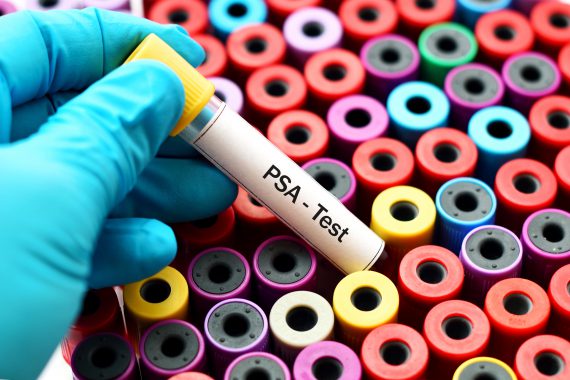A personalised genetic score has been developed for predicting a man’s risk of developing aggressive prostate cancer.
It is hoped the test could help refine screening by guiding doctors on who to screen with PSA testing and at what age, the international team of researchers say.
The test was developed from an analysis of 200,000 gene variants from more than 31,000 men with and without prostate cancer.
A risk score was then developed based on 54 variants found to be associated with an increased likelihood of the disease before being tested in a clinical trial of 6,400 men.
Results published in the BMJ show the score was a highly significant predictor of age at diagnosis of aggressive cancer.
The researchers found that men who scored in the top 2% had an almost three-fold greater relative risk for aggressive prostate cancer compared with men with average risk.
It would be, they say, relatively inexpensive to implement and because the score identifies a man’s fixed genetic risk, it only has to be done once – well before disease onset – and could then ‘substantially inform the decision of whether he should undergo screening’.
They concluded: ‘This genetic risk model might play a role in guiding decisions about whether and when to screen for prostate cancer.
‘Investigation into the relation between the score and early midlife PSA testing is warranted.’
Professor Mike Kirby, a GP and visiting professor to the Prostate Centre, London, said the understanding of genetic screening for prostate cancer had moved on a lot in the past couple of years.
‘We know the PSA test is not good enough for screening everybody.’
He said there had been some benefits shown in testing men in their 40s, before benign prostatic hyperplasia skews the results, but a genetic test such as this one would refine the process.
‘If you could add in a genetic screen in the mid to late 40s you could determine who would need PSA testing and how often,’ he said.
Professor Willie Hamilton, an expert in primary care diagnostics at the University of Exeter Medical School, said the goal in prostate cancer was ‘identifying the nasty ones’ so doctors could make a treatment or screening decision.
He added it may not be so easy – or cheap – to apply in reality.
‘Though it’s better than not targeting, yhe problem is that the targeting isn’t that precise,’ he said.
‘The top 2% are 2.9x more likely than the ‘average’ score to have an aggressive cancer but they only have a small percentage of all the cancers, so targeting them won’t have a big population effect.’
Pulse October survey
Take our July 2025 survey to potentially win £1.000 worth of tokens













